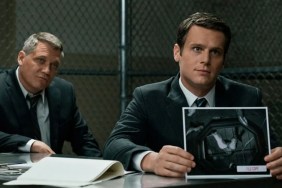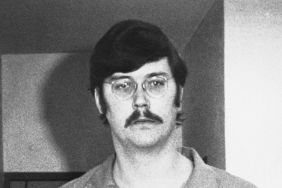On October’s Friday the 13th, Netflix and director David Fincher (Gone Girl, Seven, Fight Club) released a new and original psychological series, Mindhunter, focused on exploring not only the minds of some of America’s worst serial killers, but also the history of how the FBI finally incorporated psychology into their criminal investigations. Set in the 1970s, and based on real-life serial killers and the FBI agents who interviewed them in order to understand the psyche of a killer, Mindhunter mixes fact with fiction to deliver a stellar, fascinating, and intense drama. There are a few reasons why this is Netflix’s must-see original series of 2017.
David Fincher
David Fincher is known for his stylistic approach to films and projects that explore character and psychology above all else. He has taken audiences into the minds of the most disturbed and wonderfully imperfect, complex characters, and Mindhunter is no different. In an interview with Collider, Fincher explained that he wanted to explore the reality that serial killers are “real, sad people,” and that the reason we are so fascinated by them is because “we’re nothing like them.”
Real-Life Serial Killers
History buffs and true crime fans will appreciate the factual elements of the show, which is based on a book, Mindhunter: Inside the FBI’s Elite Serial Crime Unit, by real-life FBI agent John Douglas, who worked for the FBI Investigative Support Unit for 25 years. The book provides a look into real criminals and serial killers that were psychologically profiled by Douglas, who has an incredible ability to get into the minds of the killers in order to create profiles for each of them that help to explain their habits. His experience in interviewing and studying these individuals, including Charles Manson and Ed Gein, established a framework for getting into the minds of the most disturbed perpetrators in the United States.
The main character of the series, Holden Ford, is based on Douglas, but the fictionalized part of the series is mainly the narrative that occurs in Ford’s personal life with his girlfriend, Debbie (Hannah Gross), as well as the personal lives of his partner, Bill Tench (based on real-life FBI agent Robert Ressler) and Dr. Wendy Carr (based on real-life Dr. Ann Burgess). Their work on creating a system of serial killer profiling based on patterns in habits and psychology, however, is real enough, as is the criminals themselves. The real names of the serial killers that are interviewed and studied in the series are used, as well as their likenesses. The crimes of these killers, including Ed Kemper and Jerome Brudos, that appear in the show are also accurate. Mindhunter even used some dialogue from real video interviews with, for example, Kemper, the “Co-ed Killer,” in scenes in the show.
Holden Ford
Jonathan Groff’s captivating performance as Agent Holden Ford, the man determined to master the mind of a serial killer, is reason enough to watch Fincher’s new series. What makes Ford so interesting is the mystery behind his personality. At times you’re on this journey with him, experiencing his wonder and subtle horror while hanging on every word that comes out of a serial killer’s mouth.
Most of the time, though, Ford’s emotions are well hidden; so much so, in fact, that you will find yourself wondering whether or not Ford could be diagnosed with antisocial personality disorder like the killers interviewed in the show. Ford seems disgusted with the actions of some of the killers, but he also appears desensitized at times. He’s not afraid to break laws or rules to reach his goals, and Ford doesn’t usually show that he has any remorse for his actions when they cause turmoil.
With that being said, Ford isn’t entirely emotionless or heartless. What you come to figure out while watching his character over the ten-episode first season, is his ability to compartmentalize, as well as the negative side effects of immersing yourself so deeply into a serial killer’s mind. His relationships slowly begin to crumble throughout the season, and it all stems from his interactions during his in-person interviews with those serial killers, though he doesn’t seem to realize it’s happening until the season finale.
One of the best moments of the first season comes in the finale episode, when Ford’s walls are shattered in a moment of pure panic and fear, and the audience realizes how tightly his emotions have been buried underneath a relentlessly logical, determined, stubborn exterior, that has been slightly influenced by the darkness he surrounds himself with. Ford having to face the reality of what can happen to you when you delve too far into a serial killer’s mind and perspective is a powerful moment, and arguably the most revealing scene of Ford’s character.
The Behavioral Science Unit
The best part about Mindhunter is the relationship between Agents Ford and Bill Tench (Holt McCallanay). The two make a great serial killer investigating duo, their respective intelligence, personalities, and age difference providing a great balance and realistic partnership that also provides a bit of comedic relief at times.
Real-life FBI Agents Douglas and Ressler were actually the ones who initially coined the term “serial killer” in the first place, and their series counterparts Ford and Tench, with the help of Dr. Carr (Anna Torv), are seen perfecting the terminology the FBI and other law enforcement agencies still use today. This includes the established vernacular of grouping certain offenders into either “organized” or “disorganized” categories. In reality, trailblazer Dr. Burgess, who Carr is based on, didn’t join the team until after she established her expertise and pioneered “the treatment of trauma and abuse victims.”
Carr’s presence on the team in the show, however, creates another perspective that is refreshing and necessary for the audience. Carr brings a certain morality and organization to the group, meaning she sometimes finds herself in confrontation with the improvisational Ford on how the interviews with the serial killers should be handled. When the two characters clash, it brings up an interesting question: How far is too far when trying to understand or catch a serial killer?
The Overarching Story
There is a bit of a mystery within a mystery that plays out in brief scenes at the beginning of nearly every episode before the opening credit sequence. These short clips, following a man in Park City, Kansas, who works for ADT and is seen sending letters, scoping out houses, and clearly planning a murder, are kept relatively separate from the main storyline (save for a couple of subtle references), but they are clearly foreshadowing an eventual, more obvious connection between the two narratives.
After studying the clues from each short scene, including the location, time period, and how the man works for ADT, it’s not hard to figure out who this unnamed character is meant to be based off. In the season finale (spoiler alert) when we travel back to Kansas for another brief moment, you see the character burning images of women who have been bound, tortured, and killed. True crime fans (or anyone who knows how to Google) will realize pretty quickly that the mystery man is clearly meant to be Dennis Rader, the B.T.K. (bind, torture, kill) Killer.
Agent Douglas also wrote a book specifically about the B.T.K. Killer and the FBI’s 30-year hunt that wasn’t solved until 2005. While the creators of the show intend on exploring many other serial killers, as reported by Vanity Fair, it seems they will eventually pull Ford and his team into the hunt for Rader. With the cat-and-mouse game spanning nearly three decades and leaving 10 people dead before Rader was caught, it will be interesting to see if, while the team continues interviewing other notorious serial killers, the show continues showing these vignettes of the B.T.K. Killer in every episode.
It’s All About Conversation
David Fincher faced a challenge in attempting to tell a story whose narrative is largely driven by conversation, but found a perfect format in Netflix’s serialized, binge-watchable style. FBI agents and action scenes are usually synonymous in an audience’s mind, but Fincher defends that conversation is compelling, too, because, “there are acts and movements in the way that people move their agenda, and try to understand and look for clarification, and that stuff can be as interesting as people running through the streets showing their badges.”
If anyone can make it work, it’s Fincher, and he definitely nailed it with Mindhunter.
Locations, Lighting, and Soundtrack
As with any David Fincher production, the sets and cinematography are aesthetically gorgeous in the show. Filmed in and around Pittsburgh and Pennsylvania, the crew built some of the locations while also using established buildings to double as settings in the script, such as the former State Correctional Institution in Greensburg being used as the Salem Oregon State Penitentiary that you see Ford and Tench visit in the show.
The lighting provided a special touch and tone to the series as well, according to No Film School. Stemming from the collaboration between Fincher and Director of Photography Erik Messerschmidt, the pair wanted to create a “surrealist naturalism” to the scenes, particularly by focusing on allowing night or dark interiors to “go dark or be in silhouette,” while also allowing a light that is “in a frame [to be] lighting a scene.” As far as camera work, they utilized a dolly in order to maintain simplicity, not wanting to use “a bunch of fancy camera movement.”
Complete with vintage cars, ’70s technology, and an old-school soundtrack, the masterful crew behind the scenes know how to put you directly into the time and vibe of the series with an added David Fincher taste.
It’ll Leave You Wanting More
The first thing you will want to do when finishing season one is immediately binge-watch those ten episodes all over again. That, or beg the cast and crew on social media to release season two already. The season ends on a bit of a cliffhanger, particular for Agent Ford, and it will be a long, hard wait for fans for any new episodes. The good news, though, is that writer Joe Penhall has already written a five-season plan for the show. Despite Netflix not yet officially announcing a renewal, pre-production on season two has already started.
Fans and critics alike have raved about the exploration of dark minds and the FBI’s integration of psychology and behavioral science, as well as the open dialogue on the mental health (including the environmental conditioning) of a serial killer and their behavior. If you haven’t yet discovered this new hit series, what are you waiting for?










